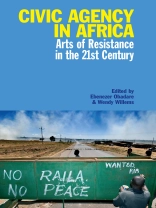Examines the variety of mostly unorganized and informal ways in which Africans exercise agency and resist state power in the 21st century, through citizen action and popular culture, and how the relationship between ruler and ruled is being reframed.
The recent eruption of popular protests across North Africa and the Middle East has reopened academic debate on the meaning and strategies of resistance in the 21st century. This book argues that Western notions of state and civilsociety provide only a limited understanding of how power and resistance operate in the African context, where informality is central to the way both state officials and citizens exercise agency.
With the principle of informality as a template, the chapters in this volume collectively examine the various modes – organised and unorganised, formal and informal, urban and rural, embodied and discursive, serious and ludic, online and offline, successful and failing – through which Africans contend with power. Resistance takes place against the backdrop of deep fractures in state sovereignty, the remnants of colonial rule and the constraints of a global, neoliberal economic system.
Ebenezer Obadare is Associate Professor, Department of Sociology, University of Kansas; Wendy Willems is Assistant Professor, Department of Media and Communications, London School of Economics and Political Science (LSE) and Honorary Research Fellow, Department of Media Studies, University of the Witwatersrand, Johannesburg, South Africa.
Tabla de materias
Foreword by Patrick Chabal – Patrick Chabal
INTRODUCTION – African resistance in an age of fractured sovereignty PART ONE: POST-COLONIAL STATE FORMATION AND PARALLEL INFRASTRUCTURES – Ebenezer Obadare
INTRODUCTION – African resistance in an age of fractured sovereignty PART ONE: POST-COLONIAL STATE FORMATION AND PARALLEL INFRASTRUCTURES – Wendy Willems
Global technologies of domination and arts of resistance in Africa: from colonial encounters to the Arab Spring – Sabelo J. Ndlovu-Gatsheni
Citizenship from below: the politics of citizen action and resistance in South Africa and Angola – PART TWO: EMBODIED MODES OF RESISTANCE AND THE POST-COLONIAL STATE – Bettina von Lieres
The politics of confinement and mobility: informality, relocations and urban re-making from below – Ilda Lindell
The politics of confinement and mobility: informality, relocations and urban re-making from below – Markus Ihalainen
Overcoming socio-economic marginalisation: Young West African hustlers and the reinvention of global capitalism – Basile Ndijo
Accepting authoritarianism? Everyday resistance as political consciousness in post-genocide Rwanda – PART THREE: POPULAR CULTURE AS DISCURSIVE FORMS OF RESISTANCE – Susan Thomson
Participatory politics in South Africa: social commentary from above and resistance from below – Innocentia Jabulisil Mhlambi
Laughing at the rainbow’s cracks? Blackness, whiteness and the ambivalences of South African stand-up comedy – Grace A. Musila
‘Beasts of no nation’: Resistance and civic activism in Fela Anikulapo-Kuti’s music – PART FOUR: PUBLICS AS EVERYDAY SITES OF RESISTANCE – Jendele Hungbo
The power of resonance: Music, local radio stations, and the sounds of cultural belonging in Mali – Dorothea E. Schulz
Narrating the contested public sphere: Zapiro, Zuma and freedom of expression in South Africa – Daniel Hammett
Sobre el autor
SUSAN THOMSON is Associate Professor of Peace and Conflict Studies at Colgate University.












